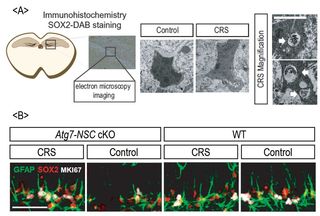Stress
Chronic Stress May Trigger a Double Whammy of Brain Damage
Chronic stress may cause brain cell death and stifle the birth of new neurons.
Posted August 10, 2019
New research in mice suggests that chronic stress may cause the death of adult brain cells in the hippocampus while simultaneously inhibiting the birth of new hippocampal neurons. The technical terms associated with this double whammy are autophagy which means "self-eating" in Greek and neurogenesis which describes the formation (or "birth") of new neurons.

This paper, "Autophagic Death of Neural Stem Cells Mediates Chronic Stress-Induced Decline of Adult Hippocampal Neurogenesis and Cognitive Deficits," was recently published in the journal Autophagy.
The hippocampus is considered a primary memory hub. As the title of this paper suggests, the stress-induced death of hippocampal neurons combined with the decline of new neurons being born in the hippocampus may result in cognitive deficits.
For this study in mice, Professor Seong-Woon Yu and colleagues from the Department of Brain and Cognitive Sciences at Daegu Gyeongbuk Institute of Science and Technology (DGIST) in South Korea examined the specific mechanism that control the "self-eating" autophagic cell death (ACD) of hippocampal neural stem cells (NSCs) during chronic stress.
The main takeaway of this research in mice is that a gene called "SGK3 (serum/glucocorticoid regulated kinase)" appears to be triggered by chronic stress and may initiate cell death in the hippocampus via autophagy.
This study is noteworthy because, until now, the exact mechanisms underlying the loss of brain function associated with chronic stress were not well understood. Previous animal studies have shown that the generation of new neurons via neurogenesis tends to be much lower in "stressed out" mice, but these studies did not identify the double whammy of chronic stress also resulting in cell death via autophagy.
What is the most promising aspect of this new study? For the first time, the research team discovered that normal brain functions in mice exposed to chronic stress are maintained when one of the autophagic genes that triggers "self-eating" cell death called "autophagy-related 7" (ATG7 ) is deleted.
"It is clear from our study that cognitive defects and mood disorders brought about by stress are through autophagic death of adult hippocampal neural stem cells. With continuous research, we'll be able to take a step further toward the development of effective treatment of psychological disorders such as depression and anxiety," Professor Yu said in a news release. "Furthermore, stress-related neurodegenerative diseases, including dementia, could also benefit from our study."
Future research by Professor Yu and associates will aim to develop faster and more effective treatments for mental health disorders through a joint research initiative with the Chinese National Compound Library. Together, they hope to develop an SGK3 inhibitor that could potentially help people suffering from chronic stress maintain better brain health by blocking the autophagic death of hippocampal neurons.
In the meantime, taking steps to reduce chronic stress could also help to protect your brain from the double whammy of increased cell death and decreased birth of new neurons in the hippocampus. Some effective stress-busters you can easily incorporate into daily life include physical exercise, diaphragmatic breathing with longer exhalations, and stress-relief from laughter.
References
Seonghee Jung, Seongwon Choe, Hanwoong Woo, Hyeonjeong Jeong, Hyun-Kyu An, Hyewon Moon, Hye Young Ryu, Bo Kyoung Yeo, Ye Won Lee, Hyosun Choi, Ji Young Mun, Woong Sun, Han Kyoung Choe, Eun-Kyoung Kim & Seong-Woon Yu. "Autophagic Death of Neural Stem Cells Mediates Chronic Stress-Induced Decline of Adult Hippocampal Neurogenesis and Cognitive Deficits." Autophagy (First published online: June 24, 2019) DOI: 10.1080/15548627.2019.1630222


